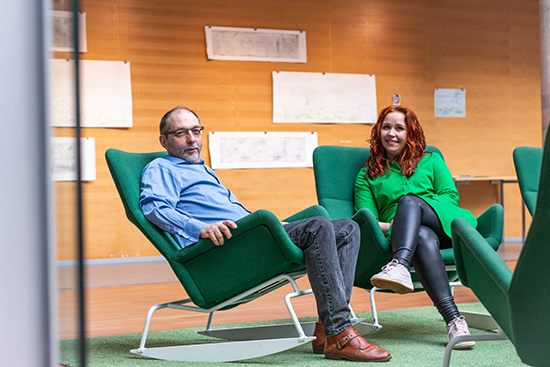The conferment ceremony is a festive transition rite for masters and doctors. It will be held for the sixth time at the University of Lapland in May 2024.
What on earth is a conferment ceremony? The word may be familiar, but its meaning unknown. Does it have something to do with doctors? A quick web search doesn’t help, because the details and terminology of conferment vary from one university to another. Conferment Committee Chair Timo Aarrevaara and Secretary Hannele Alajoutsijärvi will explain what we are dealing with here.
"Above all, it’s a transition rite for people leaving behind a long period of studying. After a week of celebrating, a person finally realises that the transition has taken place,” Timo Aarrevaara chuckles.
According to Aarrevaara, we have a conferment ceremony approximately every fifth year, and it is intended for masters and doctors from all our faculties. The next conferment week starts a year from now on 13 May 2024, and it is open to all masters and doctors who have graduated from the University of Lapland after the conferment ceremony of 2019.
“For us at ULapland, it is important to celebrate masters as well as doctors. In fact, the history of conferment in Finland dates back to the masters’ conferment, which was partly connected to the medieval guild tradition. Today’s conferment tradition, lasting several days and mostly in keeping with the culture and festivities of the 1800s, is carried on by the university community,” Aarrevaara notes.
The week of festivities starts on Floora’s Day, when also those can attend who do not take part in the other events of the week. On Floora’s Day, or Flower’s Day, the official wreath weaver is announced. This person is to be an offspring of a professor of the university.
After the conferment week has begun, the laurel wreaths are tied. As a symbol of knowledge and scholarship, a laurel wreath is made to all the participating masters, or promovendi. The official wreath weaver is to supervise the weavers of the masters’ laurel wreaths. At the same time, there is a sword sharpening event, where each doctor has a chance to present a sword statement depicting the use of academic knowledge.
The week culminates in the act of conferment, where the promovendi are conferred the rank of master, honorary doctor, or doctor by following a precise choreography. After the act, the conferment procession advances to attend a service or a nonsectarian event that is organised next year for the first time. Then, there will be a festive dinner, after which the participants proceed to the conferment ball. The week is topped off with a trip on Saturday. The choreography of the ball and conferment act is rehearsed in advance so that everyone knows how and in which order the ceremony progresses.
"People have certain assumptions of what a conferment is like. There are fixed traditional schedules, proceedings, dress codes, and ceremonies. If they are altered too much, the conferment doesn’t feel ceremonial and solemn," Hannele Alajoutsijärvi says.

Hannele and Timo say that the content of the conferment is overseen by Professor Heidi Pietarinen, who makes sure that the week progresses as planned. Assisting students, or marshals, also give a hand in organising the festivities. They can be identified by their marshal’s ribbons. The marshals are led by the Head Marshal, who is typically one of the professors of the university. In the next conferment ceremony, the Head Marshal will be Matti Nojonen, professor of law. Marshal’s positions are opened up for application next autumn. We hope that students from all four faculties join us to support the arrangements.
The pandemic and the war in Ukraine – these states of emergency have had an enormous impact on the student experience. Indeed, Aarrevaara believes that the conferment celebration provides people a chance to create new networks after graduation.
"Education and responsibility are recurring themes in conferments, and the current situation makes them ever more topical. Although Lapland is our home, we cannot close our eyes to the world. Knowledge is a key to freedom, which the world is lacking at the moment. In the Conferment Committee, we have contemplated that we can enhance our togetherness and envisage a grand victory – the victory of knowledge over ignorance, good over evil, and right over wrong."
Further information on the conferment:
Hannele Alajoutsijärvi
hannele.alajoutsijarvi(at)ulapland.fi